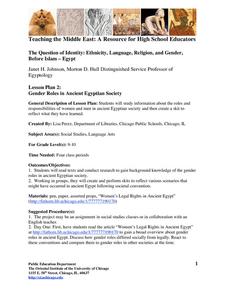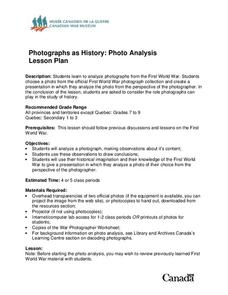North Carolina School of Science and Mathematics
Henry Kissinger and Detente
How did relations between the United States and the People's Republic of China evolve between 1950 and 1970? Your young historians will complete a timeline of events with evidence that the relationship between these two great nations was...
Student Handouts
Working with Primary Sources: The Spanish-American War
Examine the introduction to Our Islands in Their People, written by Major-General Joseph Wheeler. The excerpt, which is about two-and-a-half pages long, is included here along with six questions about the text. Pupils can learn about the...
Student Handouts
Comparing Countries’ Constitutions
Analyze the constitutions of five different countries and see how they relate to each country's culture and traditions. Pupils read the preambles to the constitutions of India, Ireland, Russia, Suriname, and the United States. After...
Population Education
Population Map
Here is a very interesting graphic of a world map where each country's size is adjusted accordingly to its population. The bottom row of the document also includes several maps depicting the major shifts and growth of the world...
Curated OER
Did Napoleon Uphold or Betray the Goals of the Revolution?
Walk your learners through constructing a well-formulated argument on Napoleon's dedication to the goals of the French Revolution.
Curated OER
Travel Scrapbook/Blog
Your young historians will design an ongoing travel scrapbook or blog as they learn about the major locations that have impacted the development of democracy in the world, including ancient Rome, Greece, England, and France.
University of Chicago
Gender Roles in Ancient Egyptian Society
After reading about the legal status of women in the Old Kingdom of ancient Egypt and doing some additional research, your young historians will work in groups to develop short skits that reflect a typical gender-role related scenario...
Calisphere
The 6 C's of Primary Source Analysis
Arm your class members with the six C's of primary source analysis—content, citation, context, connections, communication, and conclusions—and help them to establish a solid system for analyzing historical sources of information.
University of Chicago
What IS the Difference Between Sunni and Shi'ite Muslims?
The distinction between Shiite and Sunni Muslims is an often misunderstood concept, yet very important for its implications in global affairs and for a more comprehensive understanding of the religion of Islam.
University of Chicago
Exercise in Conflict Resolution
How do major religions, including Judaism, Christianity, and Islam, differ in how they view the role of individual freedoms within society, the definition of morality, and the importance of politically satisfying the greater good? Here...
We are Teachers
Read Like a Detective
Encourage your young readers to become true detectives in their next literary adventure! Here you'll find an attractive display that will prompt your learners to constantly be looking for clues, asking questions, making cases about the...
Center for Civic Education
Citizenship Schools and Civic Education During the Civil Rights Movement and in the Present
Your young historians will discover the importance that citizenship education has played in the social progress of the United States as they learn about early efforts to discourage African Americans from voting in the 1960s.
Center for Civic Education
The Power of Nonviolence: Music Can Change the World
Here is a fantastic activity through which class members discover how music has the ability to influence others in a meaningful way. After reviewing selected pieces and modern-day protest songs, learners will research other songs that...
Federal Reserve Bank
The Fed’s Toolbox
This lesson is packed with instructional material and activities on the Federal Reserve System, monetary policy, and the relationship between bank reserves, interest rates, employment, and price stability.
Student Handouts
The Cold War: The Truman Doctrine of 1947
What was the Truman administration's position on foreign policy during the Cold War? Class members respond to an excerpt from President Harry S. Truman's "Truman Doctrine" with three questions in the space provided.
Student Handouts
Examining Primary Sources: Rudyard Kipling, “The White Man’s Burden” (1899)
Combine literature and history with the poem "The White Man's Burden" by Rudyard Kipling. Pupils read the poem and answer four questions about the text.
Student Handouts
Foreign Affairs
Inform your class about foreign policy during the Reagan administration. The resource includes a reading passage that gives an overview of foreign policy decisions made during the Reagan administration and nine questions for pupils to...
Student Handouts
Voting Rights Speech Before Congress
Is your class studying civil rights? Consider taking a look at President Lyndon B. Johnson's voting rights speech. This resource includes an abridged version and three related questions. Pupils consider Johnson's use of language and the...
Center for Civic Education
The Power of Nonviolence: Change Through Strategic Nonviolent Action
How did major historical figures, such as Henry David Thoreau, Susan B. Anthony, and Mohandas K. Gandhi, explain and defend their beliefs in nonviolence? Your learners will begin by studying the backgrounds of these individuals, and then...
Center for Civic Education
The Power of Nonviolence: What Is Nonviolence? What Does It Cost?
Your young learners will delve into the language of primary source documents in order to identify the characteristics, benefits, and costs of nonviolence. The lesson includes a mix of activities, including an anticipatory activity,...
iCivics
Congress
Through reading materials, worksheets, and a primary source activity, this resource provides an overview of the structure and powers of the legislative branch of government in the United States. Readings review how a bill becomes a law,...
Canadian Museum of Civilization Corporation
Propaganda Posters
Don't be put off by the fact that the World War I propaganda posters in this packet are Canadian and some of them are even in French. All the better, in fact, to see the techniques. The richly detailed plan has instructors model...
University of Arkansas
Promises Denied
"Promises Denied," the second instructional activity in a unit that asks learners to consider the responsibilities individuals have to uphold human rights, looks at documents that illustrate the difficulty the US has had trying to live...
Canadian Museum of Civilization Corporation
Photographs as History
Imagine being a war photographer embedded in World War I. How do you see your role? How might your photos influence that study of the war? Of history? Class members select a photograph, adopt the perspective of the photographer, and...

























